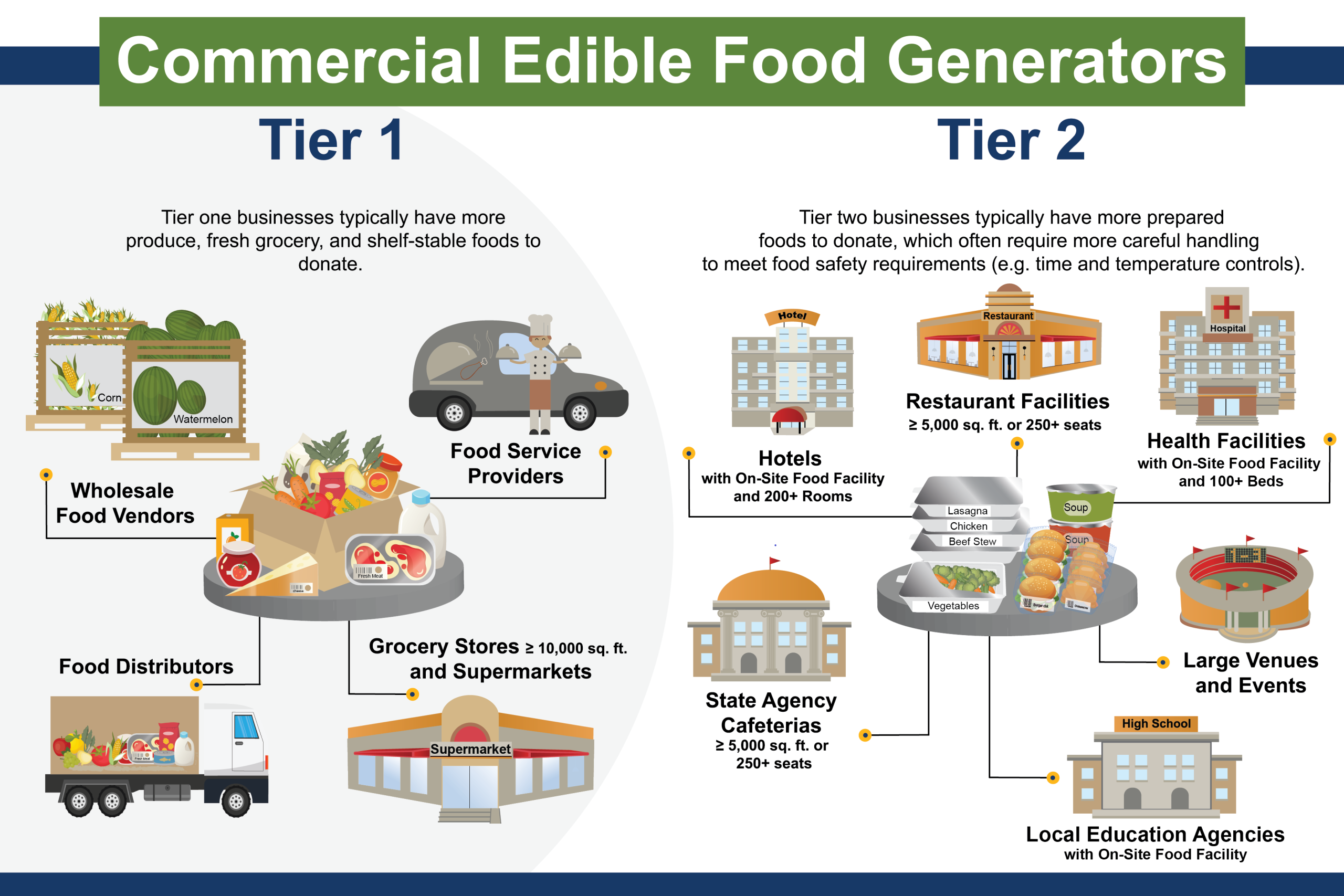For Businesses and Multifamily Owners
- Businesses and apartment/ condo complexes (of five units or more) are required to subscribe to and participate in their jurisdiction’s organics curbside collection service; or
- Self-haul organic waste to a certified facility, certified community composting program, or other collection activity or program or facility as long as records of receipts and weight tickets are kept.
- Educate your tenants
- Food establishments must have clearly labeled indoor containers for staff/customer use
- Certain businesses will be required to participate in an edible food recovery program.
- Low population area businesses will still be required to recycle organic waste if the garbage service is over two yards
Note: Businesses may be granted a waiver and exempted from some requirements if they can provide documentation and evidence to support one of the waiver options. More information about waivers in our Organics Collection Waiver section below.
As of January 1, 2022, all businesses are required to subscribe to compost and recycling collection services, unless they have an approved waiver or an alternative service (such as back-haul, self-haul, shared service, or third-party service provider) or they are located in a low population area (see map).
There are two types of waivers offered:
- Minimal generation waivers (De Minimis)
- Total solid waste collection is more than 2 cubic yards per week, and the amount of organics generated is less than 20 gallons per week.
- Total solid waste collection is less than 2 cubic yards per week, and the amount of organics generated is less than 10 gallons per week.
- Physical space waivers
- Physical space constraints prohibit the addition of compost and recycling containers.
Customers with an approved waiver will not be required to subscribe to compost and recycling service for a 5-year period.
Edible food recovery is the act of diverting surplus edible food from businesses, organizations, or events that otherwise would have been disposed of in a landfill or sent to compost for distribution to neighbors in need.
Certain large food-generating businesses and organizations have new edible food recovery requirements. Businesses and organizations categorized as tier 1 must begin comply with new edible food recovery requirement January 1, 2022 while those that fall under the tier 2 category must begin complying by January 1 of 2024.
More information on the new edible food recovery requirements and how to comply can be found here. 
Tier 1 generators include:
| Generator Type | Generator Definitions—as defined in CA SB 1383 regulations adopted October 2020 |
|---|---|
| Supermarket | A full-line, self-service retail store with gross annual sales of two million dollars ($2,000,000), or more, and which sells a line of dry grocery, canned goods, or nonfood items and some perishable items. |
| Grocery Stores 10,000+ sq ft total facility size | A store primarily engaged in the retail sale of canned food; dry goods; fresh fruits and vegetables; fresh meats, fish, and poultry; and any area that is not separately owned within the store where the food is prepared and served, including a bakery, deli, and meat and seafood departments |
| Food Service Providers | An entity primarily engaged in providing food services to institutional, governmental, commercial, or industrial locations of others based on contractual arrangements with these types of organizations. This does not include catering companies that only provide food services on an order-by-order basis to clients without holding any long-term contracts. |
| Food distributors | A company that distributes food to entities including, but not limited to, supermarkets and grocery stores |
| Wholesale food vendors | A business or establishment engaged in the merchant wholesale distribution of food, where food (including fruits and vegetables) is received, shipped, stored, prepared for distribution to a retailer, warehouse, distributor, or other destination |
Tier 2 generators include:
| Generator Type | Generator Definitions—as defined in CA SB 1383 regulations adopted October 2020 |
|---|---|
| Large Restaurants | An establishment primarily engaged in the retail sale of food and drinks for on-premises or immediate consumption with 250 or more seats, or a total facility size equal to or greater than 5,000 square feet. |
| Large Hotels | any hotel, motel, bed and breakfast inn, or other similar transient lodging establishment with 200 or more rooms and an on-site food facility |
| Large Health Facilities | a facility, place, or building that is organized, maintained, and operated for the diagnosis, care, prevention, and treatment of human illness, physical or mental, including convalescence and rehabilitation with 100 or more rooms and an on-site food facility |
| Local Education Agencies | a school district, charter school, or county office of education with an on-site food facility |
| Large Venues | a permanent venue facility that annually seats or serves an average of more than 2,000 individuals within the grounds of the facility per day of operation of the venue facility. |
| Large Events | an event that charges an admission price, or is operated by a local agency, and serves an average of more than 2,000 individuals per day of operation of the event |

